Definition of Autotrophs
Autotrophs are organisms that can produce their own food using inorganic substances. They are the primary producers in the food chain and form the basis of all ecosystems.
Types of Autotrophs
There are two main types of autotrophs: photoautotrophs and chemoautotrophs.
- Photoautotrophs: These organisms use sunlight as a source of energy to carry out photosynthesis. Plants, algae, and some bacteria are examples of photoautotrophs.
- Chemoautotrophs: These organisms utilize inorganic molecules such as hydrogen sulfide or ammonia to produce their own food through chemosynthesis. Certain bacteria and archaea are chemoautotrophs.
Process of Photosynthesis
Photosynthesis is the key process by which autotrophs produce their own food. It involves the following steps:
- Light Absorption: Chlorophyll, the green pigment in plant cells, absorbs sunlight.
- Carbon Fixation: Carbon dioxide from the atmosphere is converted into glucose through a series of chemical reactions.
- Oxygen Release: Oxygen is released as a byproduct of photosynthesis, which is vital for aerobic respiration in other organisms.
Significance in Ecosystems
Autotrophs play a crucial role in ecosystems by providing energy in the form of organic compounds for heterotrophs, which are organisms that cannot produce their own food. They also contribute to the balance of atmospheric gases by releasing oxygen and absorbing carbon dioxide.
Examples of Autotrophs
Common examples of autotrophs include:
.◂Biology Worksheets and Study Guides High School. DNA technology/genetic engineering
Worksheet/Answer key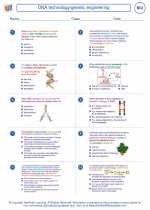 DNA technology/genetic engineering
DNA technology/genetic engineering  Worksheet/Answer key
Worksheet/Answer key DNA technology/genetic engineering
DNA technology/genetic engineering  Worksheet/Answer key
Worksheet/Answer key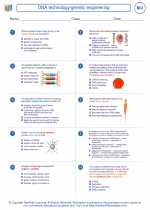 DNA technology/genetic engineering
DNA technology/genetic engineering  Worksheet/Answer key
Worksheet/Answer key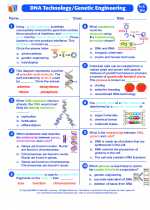 DNA technology/genetic engineering
DNA technology/genetic engineering  Vocabulary/Answer key
Vocabulary/Answer key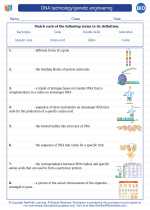 DNA technology/genetic engineering
DNA technology/genetic engineering  Vocabulary/Answer key
Vocabulary/Answer key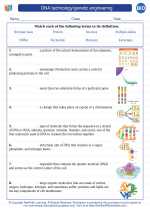 DNA technology/genetic engineering
DNA technology/genetic engineering  Vocabulary/Answer key
Vocabulary/Answer key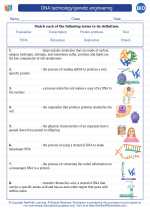 DNA technology/genetic engineering
DNA technology/genetic engineering 

 Worksheet/Answer key
Worksheet/Answer key
 Worksheet/Answer key
Worksheet/Answer key
 Worksheet/Answer key
Worksheet/Answer key
 Vocabulary/Answer key
Vocabulary/Answer key
 Vocabulary/Answer key
Vocabulary/Answer key
 Vocabulary/Answer key
Vocabulary/Answer key

The resources above cover the following skills:
BIOLOGY
From Molecules to Organisms: Structures and Processes
Formulate an evidence-based explanation regarding how the composition of deoxyribonucleic acid (DNA) determines the structural organization of proteins.
Obtain, evaluate, and communicate information that explains how advancements in genetic technology (e.g., Human Genome Project, Encyclopedia of DNA Elements [ENCODE] project, 1000 Genomes Project) have contributed to the understanding as to how a genetic change at the DNA level may affect proteins and, in turn, influence the appearance of traits.
Heredity: Inheritance and Variation of Traits
Analyze and interpret data collected from probability calculations to explain the variation of expressed traits within a population.
Analyze and interpret data (e.g., pedigree charts, family and population studies) regarding Mendelian and complex genetic disorders (e.g., sickle-cell anemia, cystic fibrosis, type 2 diabetes) to determine patterns of genetic inheritance and disease risks from both genetic and environmental factors.